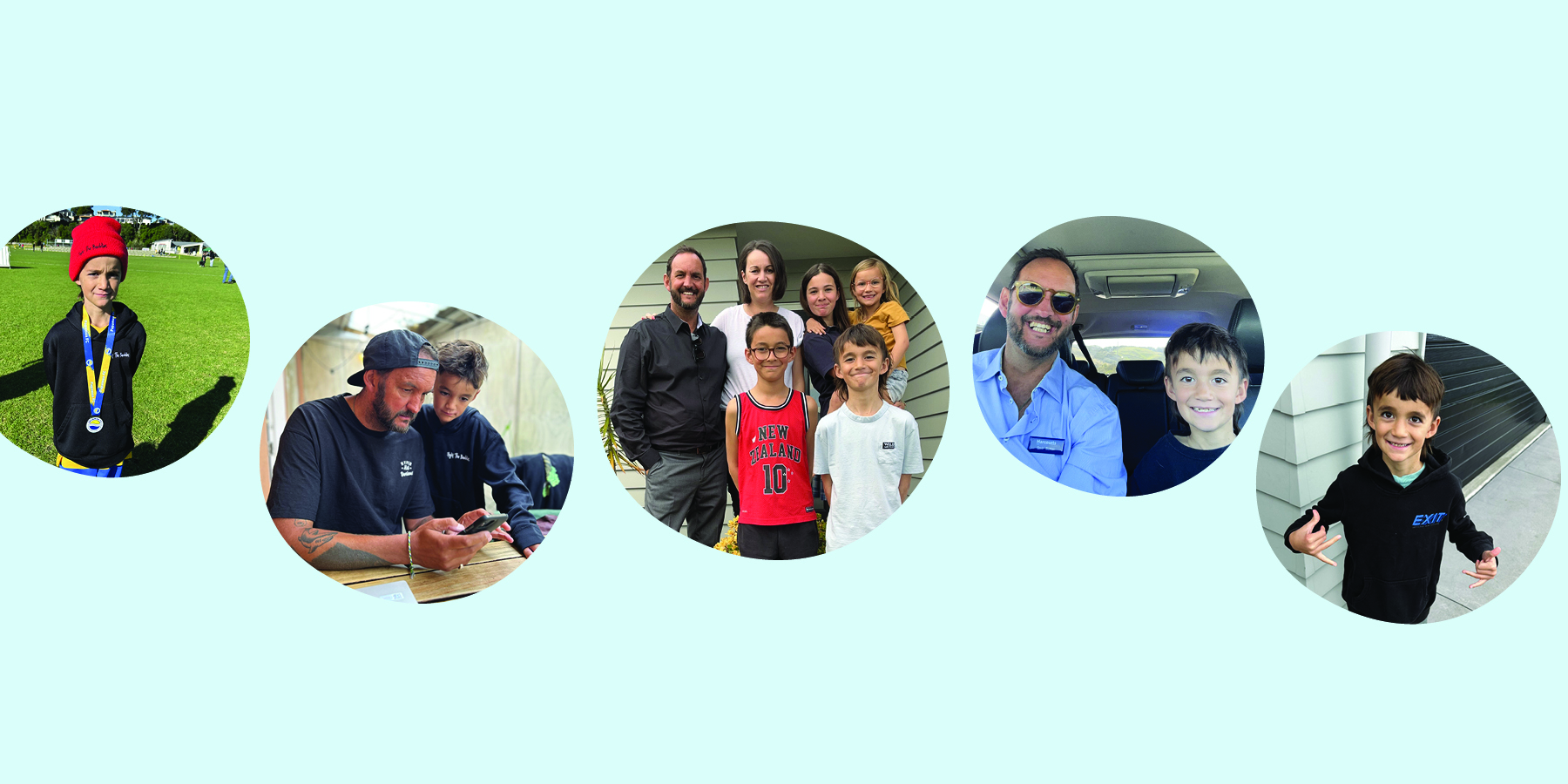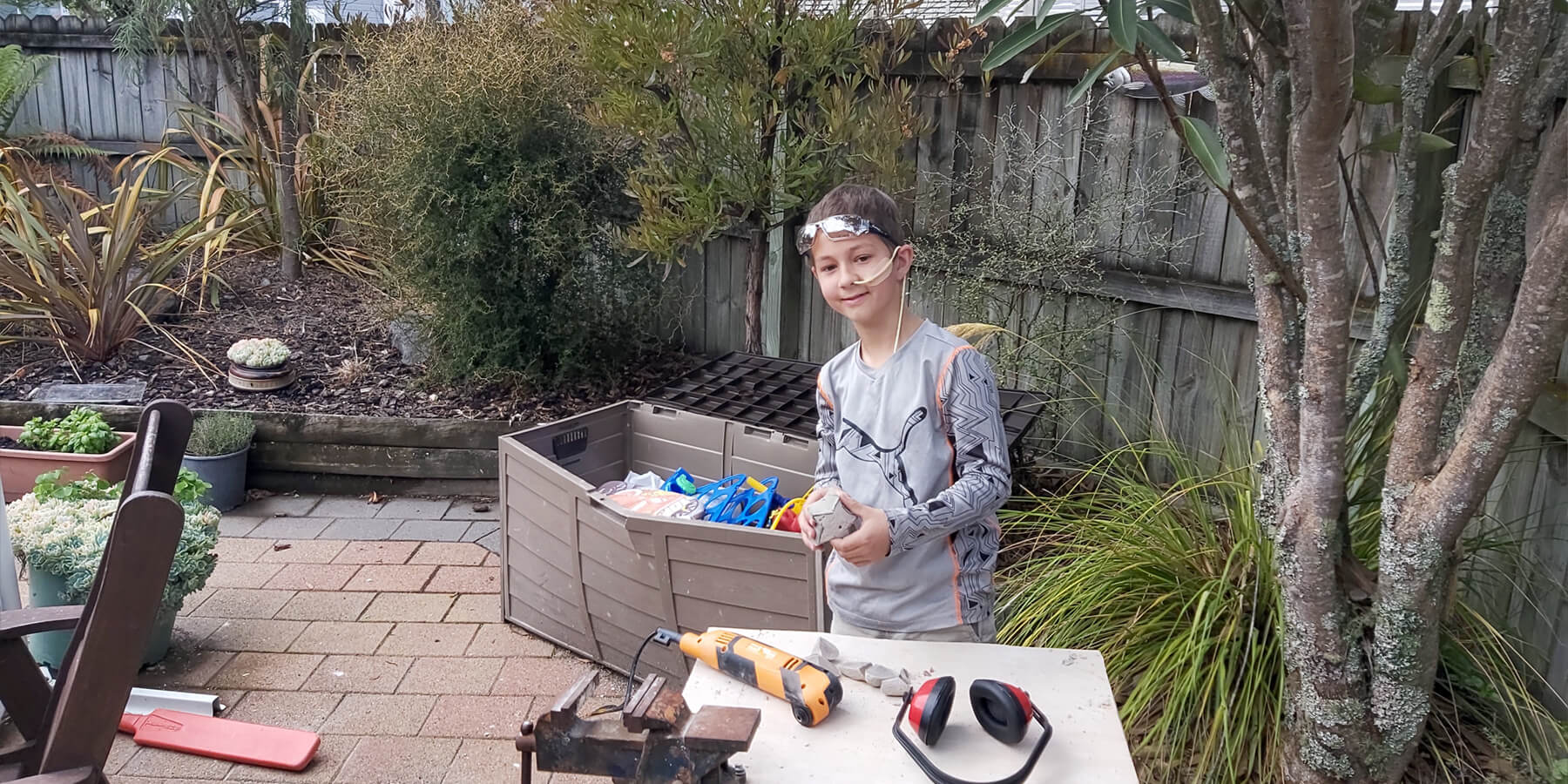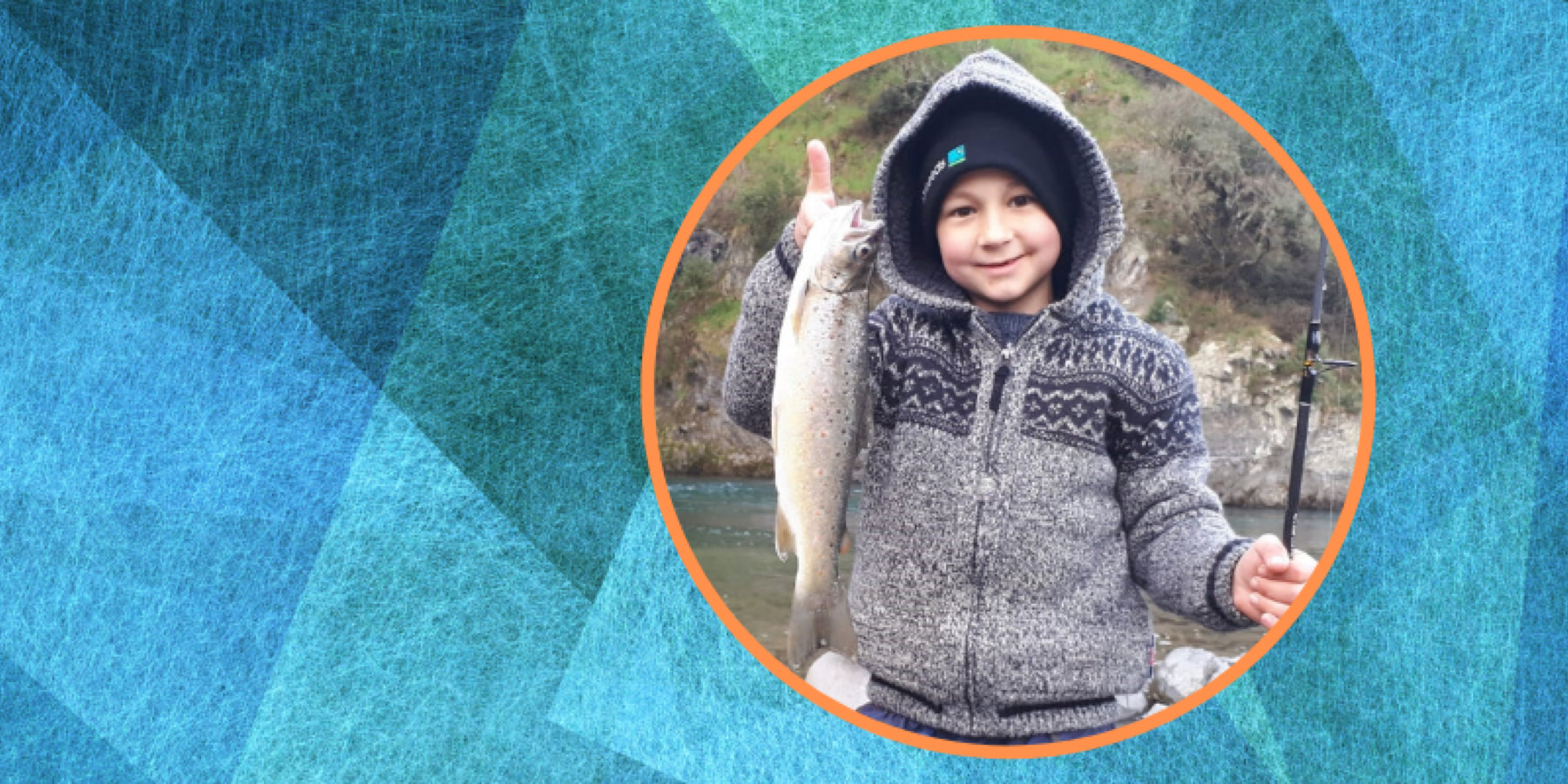A tale of family resilience
So much changed that week, but the biggest change was the Finn that we got back after surgery
This year, we spoke to Fionnlagh Adams’ family of seven about their journey through Fionnlagh’s cancer. Diagnosed with Medulloblastoma in 2022 at just four-and-a-half years old, Finn has been through more than most families could imagine.
The tight knit whānau were suddenly thrown into the unknown and split apart into three different locations to weather the storm of treatment. Arms that would normally hug were out of reach. The house was quiet. Finn’s siblings thought she would die.
This is Fionnlagh’s story.
Not in our words, but her mum’s.
Here’s Stacey on what their journey was like, and how their family persevered.
——————–
Finn’s diagnosis journey was relatively short in the grand scheme of things. It took around a calendar month from her first doctor’s appointment for a droopy eyelid to diagnosis with two more doctor’s appointments within that time.
Once she was diagnosed it was all go. Finn was diagnosed at 8.30pm on Saturday 3rd September 2022. I found out in a dark hospital room with Finn sleeping beside me. Jono, her father – he found out at the same time through a phone call sitting alone at home on Finn’s bed. We don’t know which is worse: being told in person or being alone when hearing such life-changing news.
Finn was transferred to Starship Children’s Hospital from Waikato Hospital by ambulance. She was at risk of a stroke from the pressure in her brain due to the fluid build-up. Finn and I were there by 3.30am on Sunday morning. Jono arrived later that day.
Within a week, Finn had countless MRIs, an External Ventricular Drain, met so many specialists and had so many tests. She missed everyone at home but especially her twin sister Pixie who she had never been apart from.
Finn spent her first night away from us as she was in the High Dependency Unit and we couldn’t stay with her, then finished the week with a 10-hour brain surgery.
When we said goodbye to her the morning of the surgery, we didn’t realise how much of her we were saying goodbye to.
Unfortunately, Finn is one of a very small percentage of people who have this type of surgery and have a severe brain injury as a lifelong side effect.
When she woke up, the only thing she could do independently was breathe. From there she had a shunt put in and was moved on to preparation for radiation and chemotherapy.
Prior to treatment, we had to make some hard decisions – life-changing decisions – for 4-year-old Finn, and we did, because it felt like the doctors were giving us hope that she would make it through. That she would survive!
While we were making life-altering decisions for her, we were also making them for our family at home. We have five children, including Finn.
Finn’s brother and sisters spent time at our friends’ houses for a few weeks before they went to live with family five hours away from home for five weeks. People always tried to make us feel better by saying “Oh it must be nice to have a break”, but we all missed each other terribly.
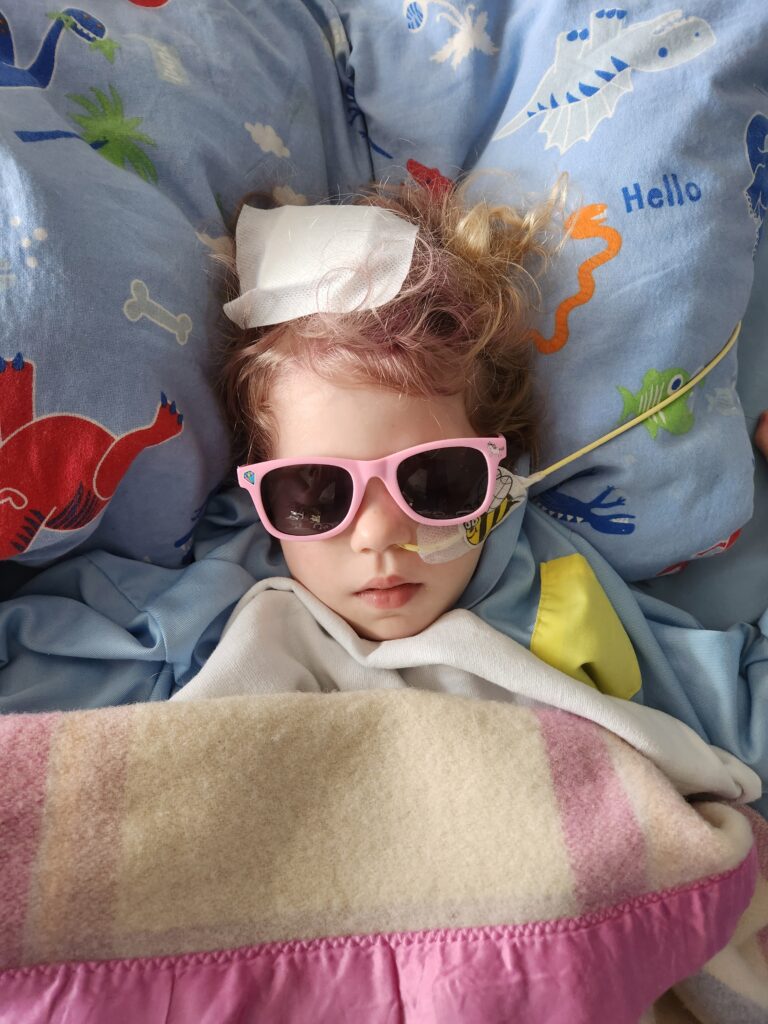
Finn is the coolest, chilliest most patient and caring child, and she didn’t care about the treatment. She loved the one-on-one time. She loves love, and being cared for.
For radiation therapy, Finn would have a General Anaesthetic (GA) every day, and go to sleep in my arms, listening to a silly song I’ve sung her since she was a baby.
She would get clipped to the table to have radiation while I waited in the waiting room, and then we would spend the rest of the day in Ronald MacDonald House. All up, she had 30 doses of radiation over seven weeks. She had a break on week four for a shunt revision.
Eventually, Finn slowly started to move more and could sign some words and talk a little bit. She had started to eat orally.
After Christmas, Finn started four months of chemotherapy. She would spend five days in Starship Children’s Hospital with Jono, then spend the rest of the month at home unless she got sick, which happened for three of the four months. Each time, she’d have to spend about a week in Waikato Hospital.
She had a port for treatment. She was so amazing at getting accessed. She never cried. She would watch and help and love the attention from the nurses. I admire her more than I could ever put into words. She showed strength and resilience for the entirety of her treatment. She never let it get her down or change what she wanted to do, or say, or be.
Post-treatment is all about rehab with the plan to have her walking independently again.
She uses a wheelchair or a walker. She can talk but has speech apraxia and aphasia. Aphasia primarily affects language (like speaking, understanding, reading and writing), while apraxia affects the ability to plan and program the muscle movements needed for speech or other skilled movements.
Finn has hearing aids and is in the process of getting glasses. She is also on growth hormones, hydrocortisone and thyroid medications as the treatment damaged so much of her body that she needs these to keep her healthy and safe.
Our whole family was impacted incredibly. We spend a lot of time together. We homeschool, Jono spends his breaks and lunch times at home, and we hang out together doing things out of the house.
Going from barely being apart to not seeing our family together for weeks at a time was perhaps one of the hardest parts.
Hearing your child has cancer, holding them while they have numerous GAs, seeing them change so much… it’s hard, but watching her siblings hear the news, see their sister as they knew her for the last time, and only seeing each other through a screen for a month is almost as hard.
We couldn’t hug the other children when we told them Finn had cancer. We couldn’t sit with them while we told them the plans on how to save her life. We couldn’t tell them in person that the sister they knew had changed so much.
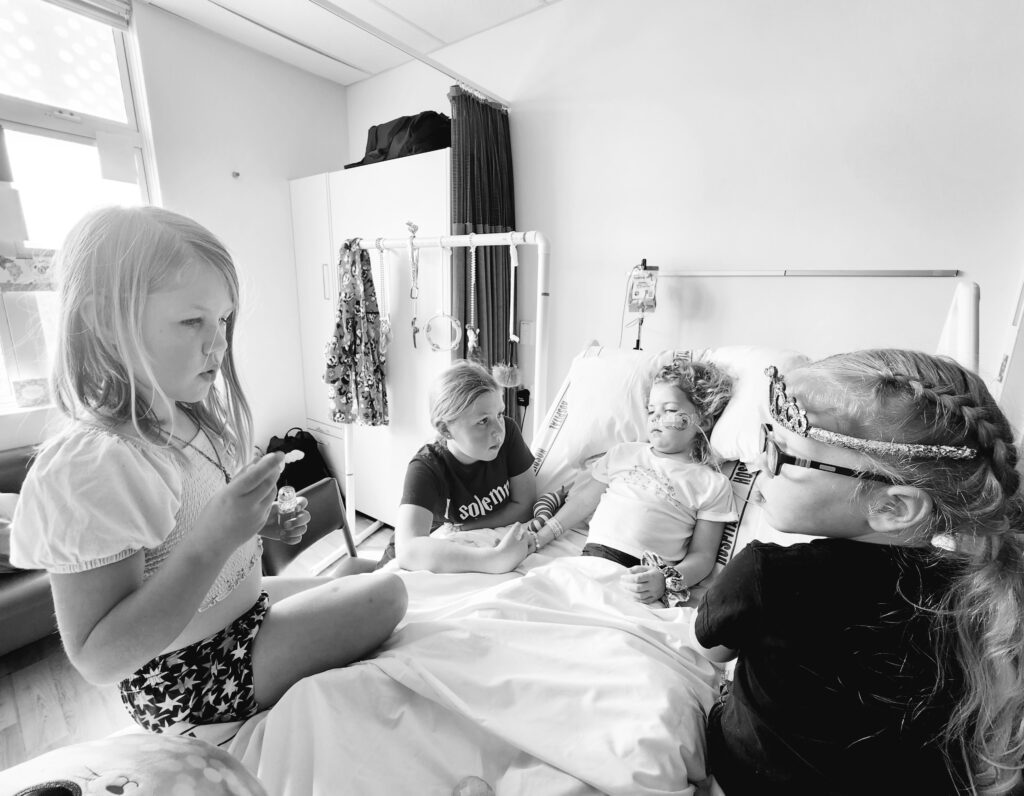
Our main challenge was keeping everyone safe and cared for while we were divided. Making sure everyone had all of their needs met while we were in three different places.
And then there are the small things, like Finn being diagnosed in winter, and when Kiki, Addison, Pixie and Ben went to my brother’s it was coming into summer. We had to fit in organising the summer clothes to pack, so they had as much of their own things as possible with them while they were away from home.
We never imagined having to talk to other people in depth about our children. Not just Finn. That’s a given, with a diagnosis like this. But our kids spent time with multiple friends and family members. Everyone they lived with in this time knew them and have known them since they were little, but they didn’t know bedtime routines. Or how they like their hair brushed. Or how they like their breakfast made. Or the right handshake to do when you say goodbye.
It was hard watching our kids be parented by our friends and family when it was the most important time of their lives for us to be the ones doing that.
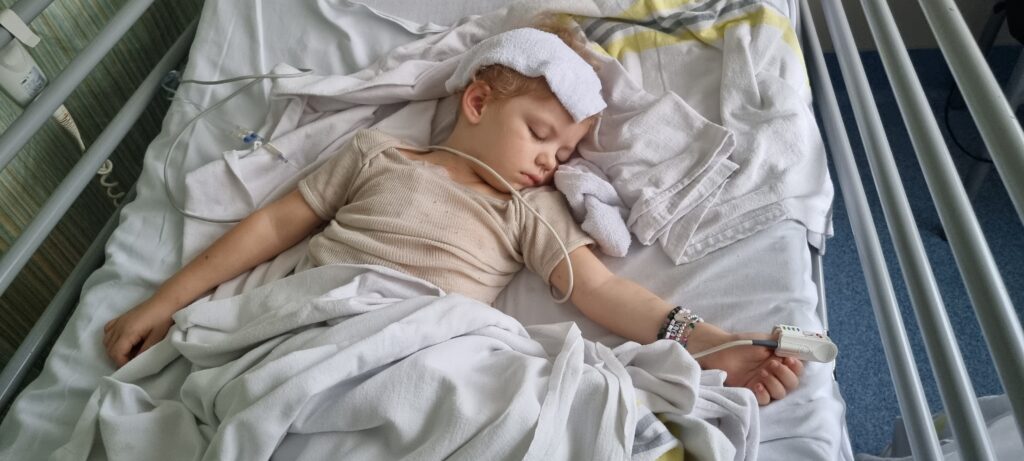
We also didn’t realise that the kids thought cancer equals death. Not until arriving home after almost a month of being in Auckland.
From the time of diagnosis, they all thought that Finn was going to die. I couldn’t believe it hadn’t occurred to us that they would think that. We decided then to be as open as we could about everything, no matter what, so that wouldn’t happen again.
We got told by a therapist in Auckland that there would be relationship hardships throughout this journey. Not just between us as parents, but between us and the kids, us and Finn, Finn and the kids at home, us and friends, us and family. They told us it is a stressful time, and it is easy to let it get between people.
Sitting in Ronald MacDonald House one night after a hard day, Jono and I understood that cancer had taken away so much from us already – we wouldn’t let it take anything else from us. We wouldn’t give it that power. Both of us agreed.
Cancer has shown us how important people are to us. How quick things can change. We thought we were a resilient family before cancer. But we see now that we had cruised through life with barely any hardship.
This journey has shown just how strong our children are. How brave they are. How smart they are. How intuitive they are. How they can read a situation and pivot. How they can see the light in any situation. How they can change how we as adults see something differently to how they do. How much we should look up to them rather than them to us.
Our children have taught us so much. We wish they hadn’t had to be the ones to teach us these lessons but what a privilege to learn from them.
Andrea, our Child Cancer Foundation Family Support Coordinator came into our lives near the end of September 2022. We didn’t want to meet her. We had just gotten home from being in Starship where you see so many doctors, specialists, nurses, physios, therapists and social workers every day.
Jono had been given a folder that had all the info from Child Cancer Foundation. Contact numbers and pamphlets and Beads of Courage information. He called me, upset, when he saw that she would be getting Beads of Courage. It was just another “my child has cancer” moment, it seemed, and we felt like meeting Andrea was going to be another one of those moments.
As soon as we met her, we were glad we hadn’t cancelled the appointment.
Andrea met us at home, the kids were there, and she knew of them all. She brought them books that were age suitable for them to understand the treatment that was being planned for Finn. She brought them their own Beads of Courage to collect. She played with them. She answered questions for them that I couldn’t answer. She listened to us. Let us cry. Helped us understand what was coming.
The best part of having Andrea in our lives during this time is that we always knew she was there. We could contact her at any time. But she never once made us feel like we had to answer or had to contact her. She was just ‘there’ in the best way.
She knew Finn’s treatment plan and would check in before the next step. She knew when Finn got admitted to hospital and would send groceries to the house in case we hadn’t got around to doing the shopping that week. She organised a payment to be made on our power account for the winter months, so we didn’t have to worry about using the heat pumps. She organised our car repair bill to be paid, made sure we knew about anything fun that was happening that the kids might like to do and usually organised tickets too.
Andrea made sure the whole family was included in her care, not just Finn. She made sure each of the kids had a chance to talk to her, made sure she asked them things and remembered what they said to follow up the next time we got to see her. She brought them gifts like LEGO or bubbles and was also so excited to see us all if we saw her outside of the house whether it was Foundation parties or in town.
Andrea making sure that everyone in our family was under her care and being looked after helped us all immensely. Knowing that she was there as a backup for us as the kids hadn’t met Finn’s Auckland medical team, helped them all have confidence that what they were seeing and hearing about Finn was right, and explained in a way they could grasp.
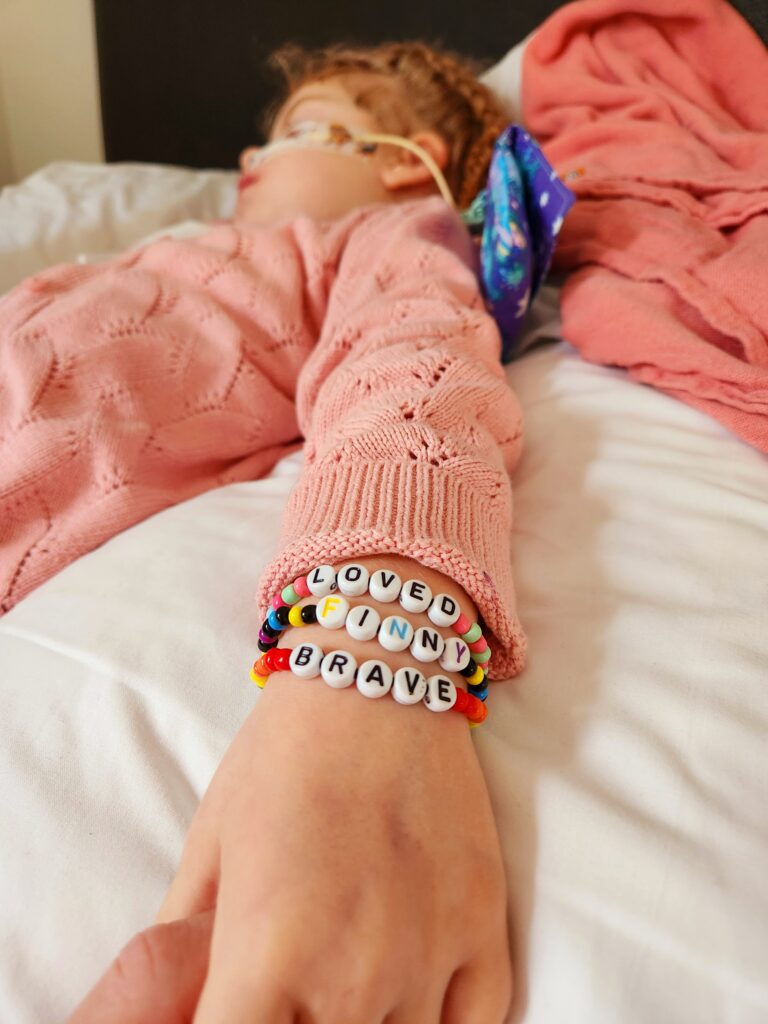
We have learned that all the people who say kids are more resilient than you think, are correct.
We couldn’t have had our family come out of this as strong as we did without people like Child Cancer Foundation and Andrea on our side. Having someone there with confidence in the process and seeing us as people rather just a patient or a patient’s family, and with compassion, made all the difference.
We would tell people new to the paediatric cancer world to take the offers of help. It doesn’t make you weak, or needy, or a burden. Child Cancer Foundation are there to help. And they want to help you.
All the things you might think are inconsequential aren’t. Getting groceries delivered doesn’t sound like a lot, but when you leave your house in the middle of the night for an emergency hospital trip and a friend comes to look after your kids and you haven’t done the groceries in a few days and you’re busy doing the admitting paperwork and meeting the doctors who are on that day and catching up on sleep and ensuring your very sick child is okay, groceries are the last thing you want to be doing. Having those things taken care of are the parts that make a difference to how your days and weeks go!
